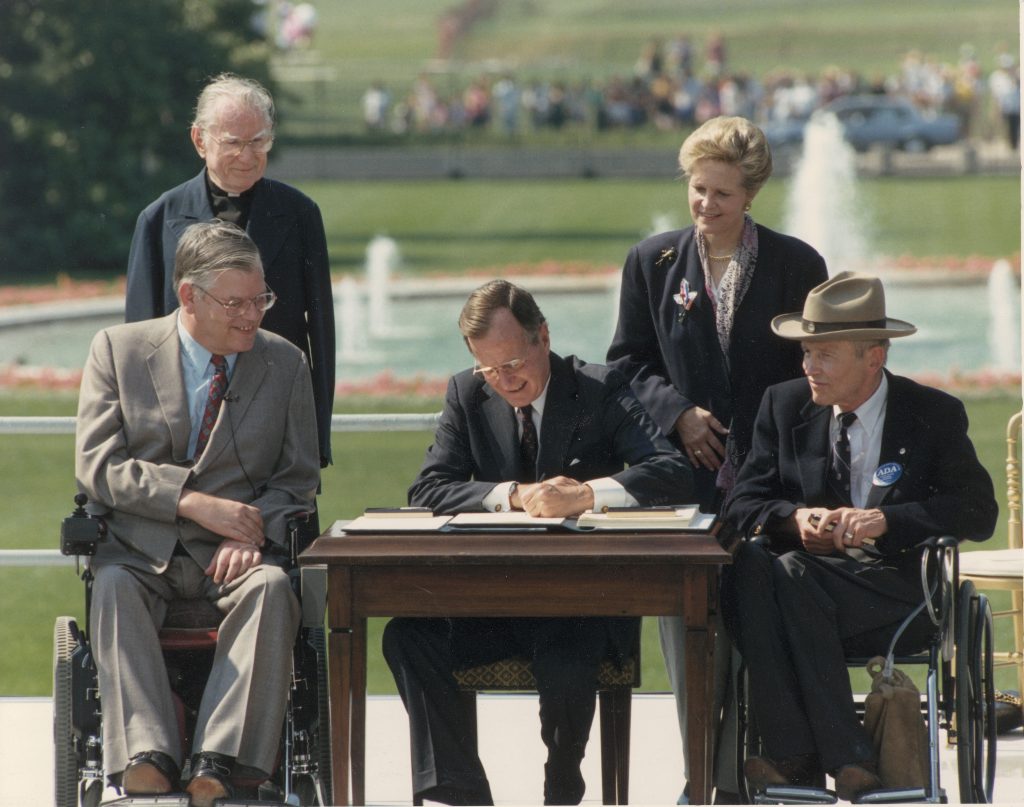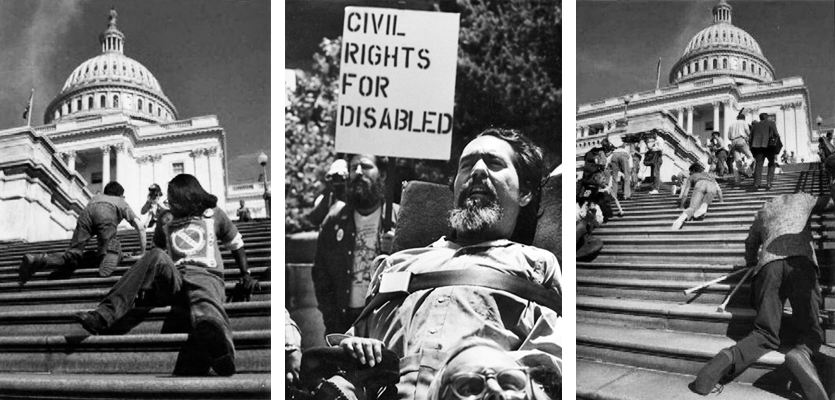30th Anniversary of the Americans with Disabilities Act
A Historical Review
 On July 26, 1990, George H.W. Bush, while seated on the front lawn of the White House, signed into law the American with Disabilities Act (ADA). This law was called into action due to the complete absence of people with disabilities in the Civil Rights Act of 1964. Although it protected people from discrimination based on race, sex, religion, or national origin, it made no mention of disabilities. This piece of legislation made discrimination in the workplace, public places, telecommunication, and businesses illegal. Employers were required, and continues to be, to make reasonable accommodations for people with disabilities in order to complete their jobs. In the public sphere, places such as stores, restaurants, and hotels were to remove any barriers that would prevent a disabled person’s ability to access that public setting. Finally, telecommunication modifications were implemented to ensure people with diverse hearing or speech needs would be able to communicate just like their non-disabled community members.
On July 26, 1990, George H.W. Bush, while seated on the front lawn of the White House, signed into law the American with Disabilities Act (ADA). This law was called into action due to the complete absence of people with disabilities in the Civil Rights Act of 1964. Although it protected people from discrimination based on race, sex, religion, or national origin, it made no mention of disabilities. This piece of legislation made discrimination in the workplace, public places, telecommunication, and businesses illegal. Employers were required, and continues to be, to make reasonable accommodations for people with disabilities in order to complete their jobs. In the public sphere, places such as stores, restaurants, and hotels were to remove any barriers that would prevent a disabled person’s ability to access that public setting. Finally, telecommunication modifications were implemented to ensure people with diverse hearing or speech needs would be able to communicate just like their non-disabled community members.
It is important to acknowledge that President Bush did not just sit down one day and sign ADA into law. It was the culmination of many years of legislation and tireless efforts of dedicated people that brought them to that moment in time. These significant actions are what we celebrate this year on the 30th Anniversary of ADA.

Each legislative victory and integral national movements to the passing of ADA are listed below:
- People’s Actions- First and foremost, thousands of people are responsible for the enactment of the ADA. Some stuffed envelopes, some protested, others wrote actual pieces of legislation, and others filed lawsuits, or were even arrested. People dedicated years of their life to the realization of ADA; there was nothing in which they believed in more deeply. Without these people, these unnamed leaders, there would be no ADA.
- Section 504 of 1973 Rehabilitation Act-Forms the basis of ADA. Section 504 bans the withholding of federal funds based on disability. For the first time, instead of viewing inequality as a consequence of the mental or physical disability itself, it was now viewed as a discrimination. Section 504 prohibited employment discrimination and also established people of diverse abilities as their own minority group.
- Civil Rights Restoration Act (CRRA) 1988-Overturning of Supreme Court decision that diminished regulation of race, ethnic, sex, or disability discrimination experienced by recipients of federal funding. The act signifies the first time that representatives of the disability community worked with other minorities on a piece of legislation.
- Amendment of the Fair Housing Act (FHA) 1988- Members of minority groups worked together so that, for the first time ever, anti-discrimination of those with disabilities were included in the civil rights ruling banning race discrimination. This addresses the segregation of housing available to people with disabilities. It also gave people with disabilities more choice in where they want to live, and ensured that reasonable accommodations would be made to people with disabilities while they secured for and navigated their housing.
- Discrimination Diaries 1988- A national campaign where people with disabilities documented their daily experiences of inaccessibility and discrimination. These diaries were documentation of discrimination and inequality, as well as a way to spread awareness regarding the obstacles people of diverse abilities faced every single day. Thousands of people with disabilities, as well as their friends and families, came together throughout the country to document discrimination experienced by people with disabilities. Justin Dart, Chair of the Congressional Task Force on the Rights and Empowerment of People with Disabilities, traveled the country to hold public hearings to collect this information. These diaries helped complete the final drafts of the ADA. It is believed that, without the courage of these people to come forward and share their stories, the passing of ADA would have taken much longer.
Stay tuned for the entire month of July as we dedicated our blog to recognizing the 30th Anniversary of the Americans with Disabilities Act.
